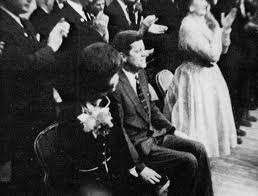johnlink ranks PRIMARY (1960)
In a way, this belongs as a Film 101 entry. PRIMARY is a sub-hour documentary about the Wisconsin Democratic primary between John F Kennedy and Hubert Humphrey. While certainly considered a film in its time, this is the sort of run time which would be an hour special on something like CNN in today’s landscape. Only, PRIMARY is more important than that. While it’s subject is certainly fascinating, it is the WAY this movie was filmed which marks it as an important moment in the history of film.
I watched PRIMARY (1960) on 11.23.13. It was my first viewing of the film.
Filmmaker Robert Drew wanted to pull back the veil on the political process. Rather than tackle a giant subject, say the national election, he chooses instead to focus on the Democratic primary in just a single state (Wisconsin). It seems as average a selection as possible. Senator Hubert Humphrey was a Midwesterner who courted the rural vote. Senator John F Kennedy was the rich Catholic who fared well in the city. Wisconsin was considered important by both men (Kennedy stated that he didn’t think he could win without taking Wisconsin), yet history has shown plenty of single states which turned out to be an anomaly in the primary process.
What was revolutionary here, then, was the way Drew went about his business. He and his team used new handheld cameras for the first time. Their microphones were small and portable. One shot follows behind Kennedy through a long alley of people as he shakes hands with admiring fans who (somehow) manage to not even notice the camera. He plows through an even tighter hallway lined with folks, and then emerges onto a stage where the camera turns, countering him to reveal the large crowd awaiting his arrival. It was a shot which really hadn’t been done in documentary before. The previous camera technology would have required this to be a choreographed and well rehearsed moment. In Drew’s film, this is merely modus operandi.
This helped launch a new style of film: cinema verite (which translates to cinema of truth). The idea was to show life as it happened rather than life as a planned process, to be a fly on the wall of the subject as it was filmed.
This, or course, begs the question: How can it be truly unobtrusive if the very act of following someone with a camera changes the way they act. Perhaps that is why PRIMARY works as a great example of the genre. Politicians are folks who’s life is a planned process. These folks are always on because they have to be. While the behind the scenes of 1960 could certainly be more behind the scenes than they would be in the modern day political atmosphere, these politicians both knew that there was always someone listening anyway. What’s a camera and a microphone going to change about the way they do things?
It was certainly interesting to watch Humphrey deftly direct the action of all of the crew members in a planned television segment in which he answered questions from common folks. He easily gives instructions, clearly has a plan, clearly sees the whole picture. Yet, when he gets in front of a crowd he is less comfortable. Humphrey comes across as genuine and as nice, yet his interactions with every day people also feel somewhat uncomfortable. Contrast that against Kennedy. He sits stoically awaiting a shoot with the lights blaring on him. Someone gives him instructions on how to sit and how to hold his hands. He feels forced, uncomfortable. Yet, as soon as the camera is on, as soon as the crowd is there, he is as calm and poised and charismatic as history remembers him.
The narration really gets out of the way in this film. There were very few narrated moments, none lasting particularly long. Drew instead trusts his subjects to tell the story through their natural interaction with folks. The story, anyway, is in what we are seeing as much as in what we are hearing. This is not a film I would regularly revisit. The video isn’t perfect and the audio is sometimes inexact in the dubbing. PRIMARY is not exciting per se, and the ending is somewhat anticlimactic. Yet, it was absolutely interesting to watch and learn. Having been born well after the assassination of JFK, it was fascinating to see him as a man rather than as an icon.
SCORES
Effect replaces Acting for Documentaries. It measures the film’s ability to make its point.
FILM: 8; MOVIE: 5; EFFECT: 7; WRITING: 7
8+5+7+7+0=27
FINAL SCORE: 6.75


